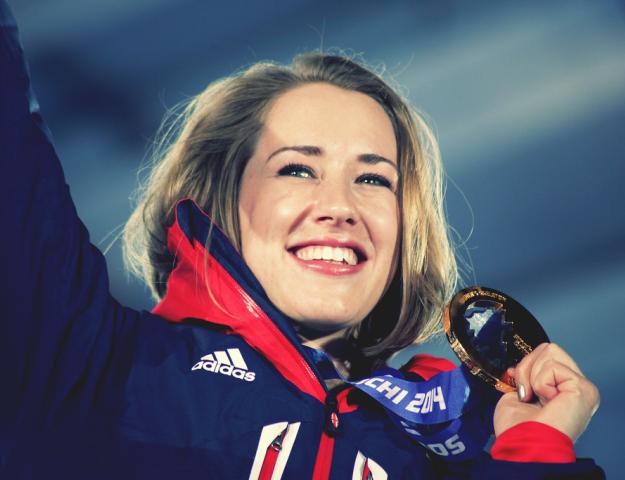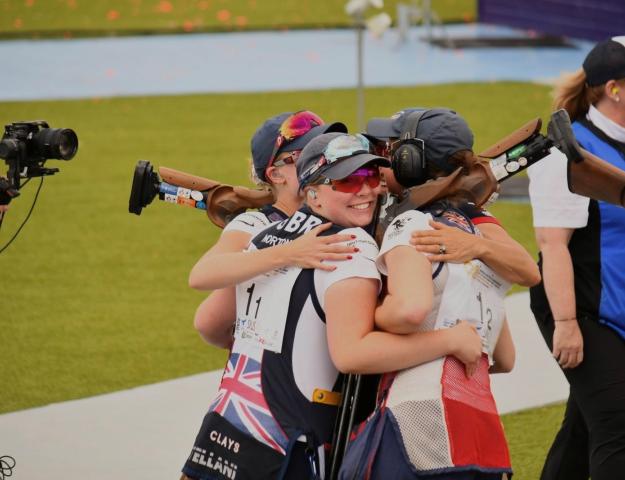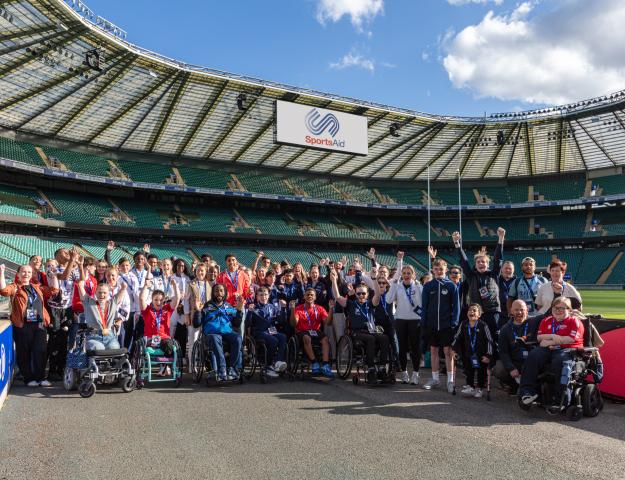- HOME
- Currently Supported
- Athlete Stories
- #MyMiles With: Summer Shaw
So what’s it like being a SportsAid athlete? #MyMiles With is a series aimed at giving YOU an insight into the lives of the next generation of British sporting heroes, and asking you to keep them company by taking part in the #MyMiles Challenge during SportsAid Week. This time it’s the turn of Great Britain judoka Summer Shaw to take you into her world....
Weekly Diary
Monday
“On a typical day, I wake up at around 7:15am. Depending on how hard my morning’s going to be, I’ll either have fruit and Greek yoghurt for breakfast, or eggs on toast. I head to training at about 10am – on a Monday morning I have conditioning, which will normally be either running or rowing. It’s definitely one of the hardest sessions of the week, but it gets my head in the right place. I then have college in the afternoon, and after that I’ll head home and have dinner. I have another, less strenuous training session in the evening, which is more technical with a focus on tactics. When I finally get home I’ll chill out, do my homework and fill in my training log.”
Tuesday
“I do weights on a Tuesday morning - until about 12pm. Each weights session is targeted at different muscle groups – there’s back and biceps, chest, triceps and shoulders, and the other one is legs. I’ll have lunch back at home, which could either be a chicken salad or a chicken sandwich….I’m a bit obsessed with chicken! I don’t have college on Tuesdays, so my afternoon will be taken up by any homework I need to do, and then I’ll just take time for myself. I’m a big Friends fan, but I need to find a new series to watch now! In the evening I go back to the judo club and do some actual fighting, alongside several drills. This session is called ‘Randori’, and it’s when we start ramping up towards the competition, putting all the tactics into play so that it becomes muscle memory by the time we get to where it matters most.”
Wednesday
“I’m doing A-Levels in PE, biology and psychology, and I’ll have my PE lesson at college on a Wednesday morning. There’s a lot of theory to go through, but it’s good because it helps me understand what’s important as an athlete. In the afternoon I head over to judo to do a technical session. After that I get a 15–20-minute break before I go straight into a gym session, and then there’s another evening session later on. Sometimes I go home in between but more often than not I’ll just stay at the club. Wednesday is probably my peak day in building up towards a competition. I’ll finish at about 9pm, and then head home. I’ll try to catch up with my friends, have a bath and then get ready for bed. I think it’s important to use some time to wind down, to stay in a good mood.”
Thursday
“I’m normally at college for the whole day on a Thursday, so I just have a judo session in the evening. I walk to college so I’ll leave at about 8:30am, and get home at about 4:30pm. My lessons are currently three hours long so it can be hard to keep concentration, but I think my time in training camps has helped with that. After college I’ll head to Judo at about 6:30pm or 7pm. It’s another Randori session, and it’s all about continuing what I’ve been working on during the rest of the week. It’s important not to go over the top though, to lower the risk of injury. In terms of food at this point in the week, it largely depends on how close you are to your weight group. Everyone’s different – some people like to sit heavily above their weight and cut down – but I think the most I’ve ever been over is one or two kilos. For the majority of the week, it’s about eating what I need to eat, and not necessarily what I want.”
Friday
“If I’m competing on a Saturday I won’t train on a Friday. In the morning I’ll do a bit of video analysis and stretching – it’s more about getting myself mentally and physically prepared to perform. If I’m doing video analysis, I might FaceTime my coach, but I tend to do most of the stuff on a Friday by myself. I’ll do my stretching in the living room, and I always have music on. It’s normally just mainstream charts stuff – a bit of everything! Depending on where the competition is I might be travelling with my mum and dad on a Friday afternoon. If it’s closer to home I’ll head to college after lunch, which is always a good distraction – you can overthink things sometimes. If it’s a big competition there might be a weigh-in on the Friday night, otherwise I’ll just stay in and watch TV with my family. Sometimes we’ll talk about the competition, but other times we won’t because it’s important not to push too hard.”
Saturday
“If I’m doing my weigh-in first thing on the Saturday, the first thing I’ll do after is rehydrate and eat. I quite like breakfast bars and malt loaf, because they’re easy to take with you and are full of energy. I’ll then have a chat with my coach and listen to some music. The music before a competition has to be quite upbeat and happy – if you listen to something depressing that’s not going to help! I like to do two warm ups – a big one which covers everything about an hour and a half before I compete, then a shorter, more relaxed one shortly before I fight. I tell myself positive things in my head just before I fight – I find that’s really important for my confidence. The main thing afterwards is to not focus only on the result, but on the performance as well. There have been some competitions where I’ve won things, but have known I could have done better, and vice versa. The thing I love to do after a competition is to have a big cheat meal, to reward myself. I like a good pizza, and when I was younger my dad and I would have a competition to see who could eat the most nuggets from McDonald’s. It’s important to have that reward and retain a sense of positivity.”
Sunday
“After a competition Sunday is a bit of a day off. I’ll have a lie in, but not for too long because otherwise it’ll mess up my routine. On a rest day I’ll chill, stretch, and catch up on some college work. I might meet up with my friends, which is important because it’s one of the biggest things you miss through doing sport. It’s been hard throughout the pandemic not being able to see people face-to-face, but I’ve been able to spend plenty of time with my family, and I’ve FaceTimed my friends quite a lot. If Sunday’s a rest day normally we’ll try to have a big roast dinner together as a family.”
Quickfire Q&A with Summer
How many hours do you train in total during an average week?
“When there isn’t a competition or a training camp at the weekend, I’ll usually train for about 20 hours. In a competition week that’ll go down to about 12-15 hours. You need a bit more rest and build-up ahead of a competition so you can go into it at 100 per cent.”
What are the first three words which come into your head when training has gone well?
“Progress – if something’s going well you can see that your hard work is paying off. Success – a positive session gives you the mindset that if you keep going that success will continue. It’s not only about the now, it’s about what you can achieve in the long term if you keep applying yourself in the same way. Confidence – having a really good session lifts your spirits. The more confident I am – especially going into competitions – the better I tend to do.”
What are the first three words which come into your head when you think about a bad day?
“Setback – when I do badly in training I take it as though I’ve gone backwards, and I can be quite hard on myself. I have to remind myself that one bad session doesn’t define everything. My parents really help me realise that I can quickly put things right. Motivation – you have to take the bad times along with the good and work to make things better. Comeback – if anything bad happens you have to maintain belief that you can emerge stronger.”
What motivates you the most?
“There are a few things that motivate me, but I think the main one is that I always want to be the best at what I do. Even if I’m doing a long run in training, I always want to push it and do the best I can. I also like making people proud, like my parents and my coach. It’s important to me to show them that all their faith in me is paying off. I also want to be a role model for younger athletes. Meeting Karina Bryant was one of the reasons I started judo, so emulating her by competing at the Olympics would be the end goal.”
How do you best measure your progress?
“In terms of strength and conditioning I think the best way of measuring things is just by using the stats, so the weight you’ve lifted, the running time or whatever. I look to build those numbers up in my sessions, and I keep my training log as well so I know how I’m doing. We’ll also do some specific testing from time-to-time, where I’ll run at max for example, or do a Cooper run. One of the best ways of measuring my progress is my own level of confidence – I know if I’m feeling good, I’ll be performing well.”
How do you balance the demands of training at busy times in your life?
“It’s important I stay organised and manage my time well, and ensure I have good communication with my teachers and my coach. My college are really understanding when it comes to the demands of my training, and if it comes to exam season my coach lets me work my sessions around them, too.”
What are the biggest sacrifices you feel you have to make?
“That’s definitely time with friends and family. At my age there are a lot of parties going on - but more often than not I’ll be at training or a competition. One of the biggest sacrifices I made was missing out on a big family holiday – I was at a training camp while my parents and brother were sat on a beach! But I wouldn’t change anything – it shows you have the required dedication, and if it was easy everyone would be doing it.”
What food and drink products do you always wish you could have?
“I’m a big foodie, and I have a really sweet tooth. Anything like chocolate or sweets is always great. I’m not fussed about drinks – I used to drink fizzy drinks when I was younger, but I’m not that bothered anymore. I’m happy with water, but I do like a big milkshake now and again. My favourite flavour is either strawberry or caramel.”
What is a work-out or session you enjoy doing?
“My favourite sessions are the Randori sessions, so more combative fighting. That’s the judo I fell in love with. I’ve always been quite small, so I always liked coming up against people bigger than me, and it also meant I had a good excuse if I lost! I also like gym and weights - the only thing I don’t really enjoy is the cardio work.”
In what ways has the COVID-19 pandemic changed how you train?
“Because judo is a close-contact sport, there was a point when I couldn’t do much at all. My programme became focused on strength and conditioning, with more shadow work and video analysis. I went back in March, so I basically had a year without proper contact judo. I thought I was going to struggle at first, but I picked things up again quickly and I’m almost back to full training now. Big training camps still aren’t going ahead and the groups are smaller, but things are getting there gradually.”
Which social media accounts can people follow you on?
Twitter: @SummersJudo
Instagram: @SummerShawxx
Snapchat: SummerS.Ox
The #MyMiles Challenge is a fun and easy way to show your support for the next generation of British athletes during SportsAid Week this September. Check out the charity's step-by-step guide for how you can get involved and start planning your own #MyMiles Challenge!




